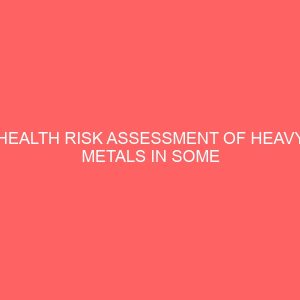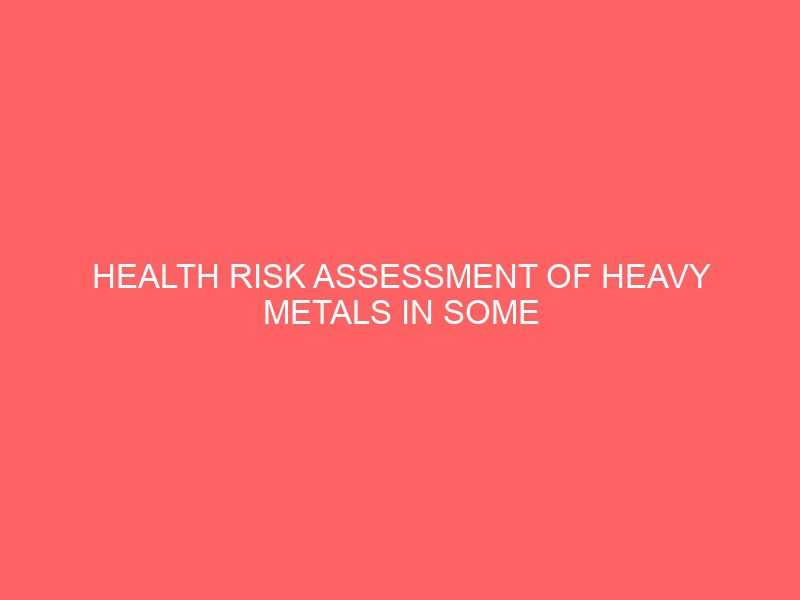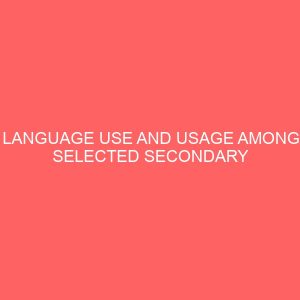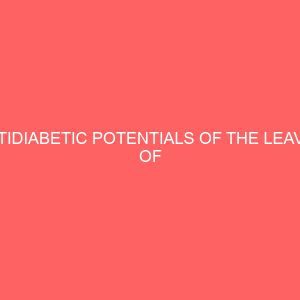Description
ABSTRACT
Heavy metals are usually components of air, soil and water. Sources of heavy metals in the environment include natural occurrence and contamination by anthropogenic sources. Studies have shown that heavy metals may be retained in food crops at higher than the permissible levels, thus posing some health risks to consumers. This study therefore, assessed the heavy metal risk to human health via consumption of some food crops in Iruekpen, Edo State, Southern Nigeria. Fifteen food crops and 3 soil samples were assessed. The food crops included: plantain Plantago majora, coconut Cocos nucifera, beans Phaseolus vulgaris, groundnut Arachis hypogaea, ginger Zingiber officienale, pepper Capsicum annuum, white yam Dioscora rotundata, cocoyam Colocasia esculenta, cassava Manihot esculenta, maize Zea mays, rice Oryza sativa both local and foreign types, green vegetable Amaranthus spinosus, fluted pumpkin Telfairia occidentalis and bitter leaf Vernonia amygdalina. Nine metals: As, Cd, Cr, Co, Cu, Pb, Hg, Ni and Zn were assayed in the crops, while Cr, Cu and Pb were analyzed in the soil samples. The samples were processed according to the method of ASTM, and analyzed using an atomic absorption spectrophotometer. The health risk indices calculated were: daily intake of metal DIM, target hazard quotient THQ, hazard index HI and transfer factor TF. Results showed that As, Cd, Co and Hg were not detectable lt;0.001 mg/l in any of the food crops, while Ni was detected only in rice and bitter leaves. The presence of the metals detected in the crops was in the order Zngt;Pbgt;Cugt;Crgt;Ni. The DIM exceeded the oral reference dose Rfd for Cr 0.003 mg/kg in yam 0.009, foreign rice 0.006, local rice 0.012, bitter leaf 0.01, beans 0.004 and pepper 0.005. The Rfd of Pb 0.0036 mg/kg was also exceeded in foreign rice 0.008. The Rfds of Zn 0.3, Ni 0.02 and Cu 0.04 were not exceeded by the DIM of any of the tested food samples. The THQ values, indicated that Cr posed serious health concern in 6 of the food samples, Pb posed a level of concern in 2 food samples by having THQs gt;1 in the samples referred. The HI was gt; 1 in 7 food samples, with the highest value being obtained in bitter leaf 4.11, while it was lt; 1 in 8 food samples, with the least value being in maize 0.10. Only Cu and Pb were detected in the soil samples. From this study, some food crops in Iruekpen are at high risk of Cr and Pb, and as such may contribute to the body burden of these metals. Efforts should, therefore, be intensified by relevant government authorities and residents of Iruekpen, to reduce environmental contamination with heavy metals to check heavy metal load in foods.
TABLE OF CONTENTS
Title page i
Certification ii
Approval page iii
Dedication iv
Acknowledgement v
Abstract vi
Table of Contents vii
List of figures ix
List of tables x
1.0. Introduction 1
1.1. Health risk assessment 2
1.2 Daily intake of metal estimation 4
1.3 Target Hazard Quotient 4
1.4 Hazard index 4
1.5 Transfer factor 5
1.6 Statement of the problem 5
1.7 Justification of study 6
1.8 Aim of study 6
1.9 Objectives of study 6
2.1 Literature review 7
2.2 Metals, Human Exposure and Effects 15
2.2.1 Cadmium 15
2.2.2 Chromium 16
2.2.3 Nickel 17
2.2.4 Lead 18
2.2.5 Cobalt 20
2.2.6 Copper 21
2.2.7 Zinc 21
2.2.8 Mercury 22
2.2.9 Arsenic 24
3.1 Study site 26
3.2 Food Samples 26
3.3 Collection of samples and analysis 26
3.4 Risk assessment indices 31
4.0. Results 34
5.0. Discussion and Conclusion 52
References 62
LIST OF FIGURES
Fig. 3.1 Map of Iruekpen and neighbouring towns/villages 28
Fig. 3.2 Iruekpen market scene 29
Fig. 4.1 Hazard indices HI 35
Fig . 4.1a Mean values of Pb across classes of tested samples 36
Fig . 4.1b Mean values of Cu across classes of tested samples 37
Fig . 4.1c Mean values of Cr across classes of tested samples 38
Fig . 4.1d Mean values of Zn across classes of tested samples 39
Fig . 4.1e Mean values of Ni across classes of tested samples 40
Fig. 4.2 pH Values and metal concentrations in soil sample analyzed 45
Fig. 4.3 Potential transfer factor for Pb from soil sample A 47
Fig. 4.4 Potential transfer factor for Cu from soil sample A 48
Fig. 4.5 Potential transfer factor for Pb from soil sample B 49
Fig. 4.6 Potential transfer factor for Cu from soil sample B 50
Fig. 4.7 Potential transfer factor for Cu from soil sample C 51
LIST OF TABLES
Table 4.1a. Metal concentrations in the different classes of food samples. 35
Table 4.2: Dietary Intake of Metals DIM of the analysed samples in mg/kg/body weight 42
Table 4.3 Target Hazard Quotient THQ 43
Appendix 1 70








Reviews
There are no reviews yet.